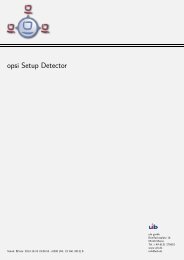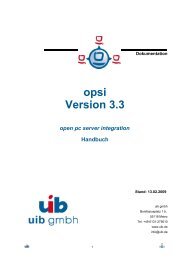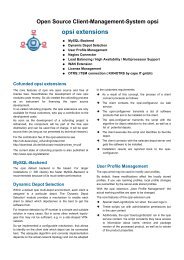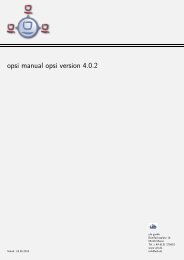opsi Version 3.3.1 - opsi Download - uib
opsi Version 3.3.1 - opsi Download - uib
opsi Version 3.3.1 - opsi Download - uib
You also want an ePaper? Increase the reach of your titles
YUMPU automatically turns print PDFs into web optimized ePapers that Google loves.
6. <strong>opsi</strong>-Module: depot server<br />
6.6. <strong>opsi</strong> V3: <strong>opsi</strong> configuration API, <strong>opsi</strong>confd and backend manager<br />
Opsi V3 comes with a python based configuration API. This API provides an abstraction<br />
layer interface to the <strong>opsi</strong> configuration, which is independent of the actual type of<br />
backend in use. Also there are some internal functions to operate on a special type of<br />
backend. The backend manager configuration file (/etc/<strong>opsi</strong>/backendmanager.conf)<br />
defines which backend type is to use.<br />
The tool '<strong>opsi</strong>-admin' provides a command line access to the configuration-API. In the<br />
corresponding chapter you get a detailed overview of the API functions.<br />
In addition the <strong>opsi</strong> server provides a web service as an interface to the API to be<br />
connected by other tools and services (for example the graphical configuration tools,<br />
<strong>opsi</strong>-wInst or <strong>opsi</strong> bootimage). The web service isn't based on XML/Soap but on the<br />
compact JSON standard (www.json.org). The web service is part of the <strong>opsi</strong><br />
configuration daemon '<strong>opsi</strong>confd'. The web service can be connected via https through<br />
port 4447 and also provides a simple interactive web GUI.<br />
The '<strong>opsi</strong>confd' runs as user 'pcpatch'. So the user 'pcpatch' since <strong>opsi</strong> V3 needs<br />
different privileges as with <strong>opsi</strong> V2.<br />
The configuration file for '<strong>opsi</strong>confd' is '/etc/<strong>opsi</strong>/<strong>opsi</strong>confd.conf'.<br />
The '<strong>opsi</strong>confd' log files are written to '/var/log/<strong>opsi</strong>/<strong>opsi</strong>confd', a separate file for each<br />
client.<br />
103








